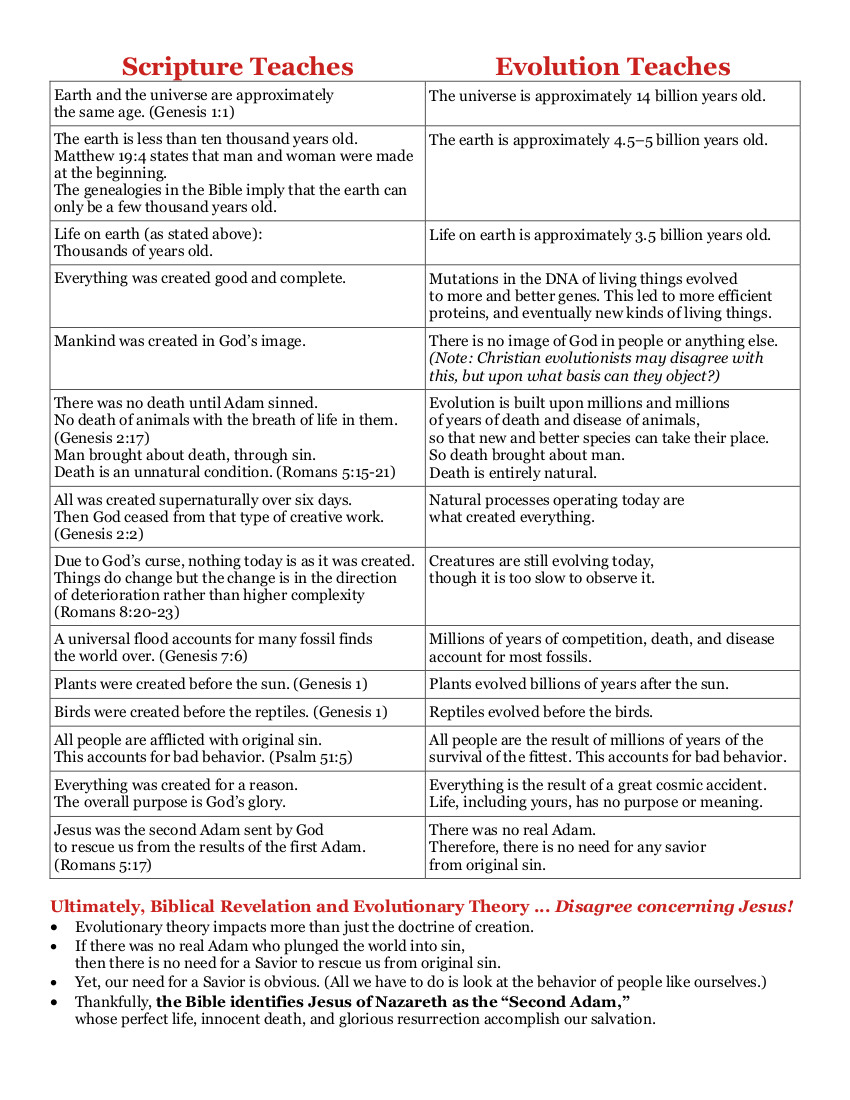Throughout history there have been many stories attempting to explain how humans and all other living things came to exist. Today there are three main positions regarding this issue:
- Living things came into being through processes of chemical evolution, in which some organic chemicals eventually began to take on the characteristics of life. After this, living things began to evolve new characteristics until all the animals, plants and other life that we see today came into being.
- God created every kind of living thing in six days according to the details laid out in the Bible. (Genesis 1–2)
- Theistic evolution (merging points 1 and 2): all living things evolved into being, but at God’s direction, taking over a billion years to do it.
The belief that living things arose through a process of evolution is widespread today, and is especially prominent among scientists. Because so many smart people hold to evolutionary theory, many Christians today think that it must be true. A Gallop opinion poll that was released in 2017 stated that 38% of U.S. adults believe that human beings came about as a result of evolutionary processes but that God guided those processes.
People naturally don’t like to swim against the flow of public opinion. Especially when that opinion seems to be represented by society’s brightest individuals! No one wants to be thought of as being “ignorant” or “less intelligent” than others. Others are afraid of the ridicule that comes with admitting that they believe the world was created by God in only six days. The number of people who believe that God created humans in their present form without using evolutionary processes dropped, according to a recent Gallup poll, from 47% in 2012 to 38% percent in 2017. Clearly Christians are being influenced by the evolutionary indoctrination that is occurring in schools, over the airways, and online.
The idea that God created living creatures through a slow process of gradual change over billions of years can be inviting. By believing that evolution occurred but was guided by God, a source of embarrassment for some Christians is removed. “After all,” they say, “evolution is a well accepted theory and, surely, thousands of scientists across several fields of science can’t be wrong.”
Why then do some Christians continue to insist that the Bible teaches that God created everything in six days a relatively short time ago?
The reason that some Christians believe that God created all living things in a short time is that the plain reading of Scripture demands this interpretation. Genesis chapter 1 clearly spells out that God created everything in six days. Not only that, but God even goes on to define what He means by a day. In Genesis 1:5 He defines the first day as a morning and an evening. Then, after telling us what He created on each succeeding day, He defines the other five days also as a morning and an evening.
But, you might ask, couldn’t God have used a process of evolution to create everything? Of course He could have. God can do anything He wants. But what does God say that He did? He tells us in Exodus 20:11, “For in six days the LORD made heaven and earth, the sea, and all that is in them, and rested the seventh day: wherefore the LORD blessed the Sabbath day, and hallowed it.”
The problem with trying to harmonize Scripture with evolutionary theory is that what the Bible teaches about creation is so different from what evolution teaches that we can’t harmonize them without distorting the teachings of one side or the other—as the chart on the next page reveals. Ultimately, the conflict between the two worldviews hinges upon what it means to be human, to be made in God’s image, and to be redeemed by God.
Dr. Doyle Holbird is professor of biology at Bethany Lutheran College. For his 3-part radio interview and synod convention essay on creation vs. evolution, visit the “Learn More” webpage: Learn More: www.els.org/apologetics
